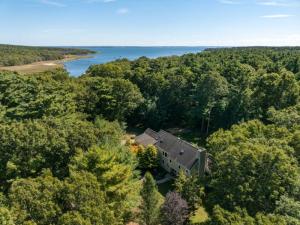Final septic regulation changes will not apply to Dartmouth or South Coast
After months of public comment and plans for legal action, the Massachusetts Department of Environmental Protection announced that Dartmouth will not be subject to new Title 5 regulations that would require residents to replace their septic systems with nitrogen-filtering technology.
Earlier draft regulation changes had labeled Dartmouth as a “Nitrogen Sensitive Area,” but new regulations limit sensitive areas to Cape Cod. MassDEP said in a statement that South Coast “communities have not had the same time to investigate and plan to address nutrient pollution” as Cape Cod communities, and they “may face different sources of pollution and environmental conditions than Cape Cod.”
One of the biggest concerns residents had with the proposed required upgrades was the price. “Active nitrogen removal systems” generally cost $10,000 to $15,000, according to the Buzzards Bay Coalition. About 2,700 homes in Dartmouth watersheds would have been affected by the regulations.
State Senator Mark Montigny issued a statement June 21, stating he is “pleased to support the Healey administration’s decision to protect local homeowners from costly septic upgrades.”
Select Board member Shawn McDonald said the final changes are “good progress,” but he’s “still wary of the process.”
In its statement, MassDEP said it still “intends to facilitate more nutrient wastewater planning for communities off Cape Cod.” It’s unclear what form that planning will take.
“I think somebody realized that what works on the Cape is not gonna work on the South Coast,” McDonald said.
At a January public comment session with MassDEP, homeowners balked at the potential costs. Several homeowners and officials also questioned why the state is hyperfocused on septic as a major pollutant instead of wastewater discharges from the City of New Bedford into Clark’s Cove.
In February, Director of Public Health Chris Michaud urged MassDEP to look into commercial composting facilities' nitrogen output rather than just septic systems.
The town previously intended to take legal action against MassDEP. At the same public meeting in January, Select Board member Shawn McDonald said the town would file an open meeting law violation with the attorney general. McDonald and Michaud contended that the department had not invited the public to its meetings.
At the June 6 Town Meeting, members voted to approve $200,000 for legal counsel “to represent the town’s interests in the proposed changes to the Massachusetts DEP Title 5 regulations and watershed permit.”
The allocated money will stay in the same account until June 2024, at which point any unused funds will go back into free cash for the town to use.
Communities on Cape Cod are required to either opt into “Watershed Permitting” or are subject to Title 5 requirements to replace septic systems. Dartmouth and other South Coast communities may still opt into the permitting process despite no longer being subject to septic regulations.
Watershed permitting is a 20-year process where communities address their nitrogen pollution with methods tailored to their situation, including “centralized wastewater treatment … aquaculture, innovative and alternative septic systems, permeable reactive barrier walls and fertilizer reduction,” according to MassDEP.
Dartmouth will still be subjected to existing Title 5 regulations.
































